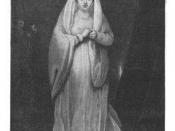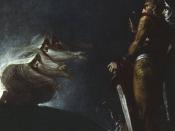It is my belief, that the character of Macbeth, in the play of the same name by William Shakespeare, was not completely to blame for the murders in his name. Macbeth's character is kind, sociable, generous, intelligent yet immature, and very loyal to his wife. The latter two played the biggest parts in his rise and fall as king of Scotland. All the events leading up to his crowning and death can be attributed to his weak personality and willingness to abide by his wife's wishes.
When first confronted by the three sisters, Macbeth, although pleased with the premonition, seems unbelieving, until he is informed by Ross and Angus, that he has been given the title of 'Thane of cawdor'. When Macbeth hears of this, he makes his first great soliloquy: "Glamis, and Thane of Cawdor: / the greatest is behind" (act 1, scene III). But even then he states, that "If fate will have me king, why, chance may crown me, without my stir" (act one, scene III).
This is saying that he intends to do nothing but let fate do what it will. He sees no reason to risk killing Duncan, and believes that if the prophecy is correct, then it would happen without his doing.
It is when Lady Macbeth reads the letter explaining the three sister's words that she takes the crowing of her husband into her own hands. She calls apon the forces of darkness to rid her of human emotion that may get in the way. "That tend on mortal thoughts! Unsex me here, and fill me from the crown to the toe top full of direst cruelty; make thick my blood, Stop up the access and passage to remorse, that no compunctious visitings of nature. Shake my fell purpose."(Act one, scene V). She worries for her husband, and that he 'is too full of the milk of human kindness' (act one, scene V) and when Macbeth decides against killing King Duncan, She Accuses Macbeth of being un loyal, "what made you break this enterprise to me?"(Act one, scene VII). And Macbeth, being the weak character he is, succumbs to her wishes, and murders Duncan. During and immediately after the murder, he feels guilt from what he has done, yet realizes that the past is unchangeable. "What's done cannot be undone" (act one, scene V).
And so, Macbeth continues to do his wife's wishes, including killing two of the king's servants, whom had been framed by the murderer himself. He realizes that if the three sister's prophecy had come true for himself, then Banquos prophecy must also have been true, in that, although Banquo would never be King of Scotland himself, his sons after him would. Macbeth organizes Banquo and fleance's assassination, and Banquo is killed, however fleance escapes. This drives Macbeth to extreme anger, and insanity soon after. He see the figure of Banquo approaching him at a banquet, his reactions enlighten his guests as to secrets hidden by the occupants of dunsinane. Lady Macbeth maintains composure throughout this, although it is evident that guilt is taking its toll on her as well.
When Lady Macbeth finally does crack under pressure, Macbeth soon understands that he is too far in to turn back and pretend nothing ever happened, and so gets more rugged in his pursuit of glory. "I am in blood, Stepped in so far that, should I wade no more,
Returning were as tedious as go o'er." (Act three, scene IV). Macbeth at this stage cares about nothing. Especially when Lady Macbeth kills herself, he then becomes ruthless, understanding at last, that all his efforts would go unrewarded and forgotten by anyone to follow. To-morrow, and to-morrow, and to-morrow, Creeps in this petty pace from day to day, To the last syllable of recorded time; and all our yesterdays have lighted fools, the way to dusty death. Out, out, brief candle! Life's but a walking shadow, a poor player, That struts and frets his hour upon the stage, And then is heard no more; it is a tale Told by an idiot, full of sound and fury, Signifying nothing." (Act three, scene V)
In conclusion, Macbeth was influenced heavily by events that he himself could not control. Be it love for his wife or a lack of understanding as to right or wrong, or even personal limitations. Some would argue that the prophecy by the three witches brought apon the rise and fall of Macbeth, although in my opinion, if the the prophecies really were just that, and then even without Macbeths knowledge of the future, he would have been crowned king. Or, maybe, the prophecies only became such, because Macbeth was told them, therefore, it was nothing more, than three old witches playing with a susceptible mind. In blood/ Stepped in so far that, should I wade no more, / Returning were as tedious as go o'er.





